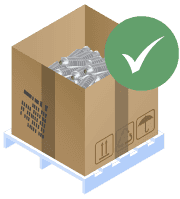Toll Refining Process
Toll-refining for all material types
PMR pioneered an efficient toll-refining process that extracts platinum, palladium, and rhodium from scrap catalytic converters. We recycle all converter material types, including ceramic, foil, DPF, aftermarket, and O2 sensors. Partnering with us empowers you to unlock every ounce of value from your material and make giant leaps towards strategic success.

Why Choose toll-refining?
Toll-refining refers to the process of contracting the refining of your metals to another party for a fee, but the refined metals remain under your ownership until final sale or disposition.
As your toll-refiner, PMR takes a representative sample from your entire load of converters tested in a laboratory. This way, you'll know exactly what precious metals are in your load, and get the full value of your catalyst material.
At PMR, all materials undergo three phases of treatment: Processing, Sampling, and Assaying.

ICP Machinery

Phase 1
Processing
PMR uses state-of-the-art machinery, engineered, customised, and built in-house to efficiently carry out our custom-made catalyst process. Converters undergo decanning, crushing, and commingling, with specialized systems created by our converter experts to efficiently capture dust and ceramic. We’ve increased our foil processing proficiency with cutting-edge systems and in-house shredding systems that eliminate any traces of lost platinum group metals.
Phase 2
Sampling
Material reaches the sampling stage after it has been thoroughly commingled into a homogenous powder. This is where we extract a sample of a given lot for laboratory analysis. Following substantial research and method analysis, we use industry standard sampling practices to ensure samples are collected and prepared adequately for laboratory testing.


Phase 3
Assaying
Assaying is the determination of platinum (Pt), palladium (Pd), and rhodium (Rh) content within a given lot by using both X-Ray Fluorescence (XRF) and Inductive Coupled Plasma (ICP) technologies. Our machinery is perfectly calibrated to each material type for the most precise evaluation results possible.
Our in-house lab and team of skilled chemists made history in 2022 by becoming the first catalytic converter processor to earn ISO/IEC 17025:2017 accreditation. This only solidifies our commitment to providing precise and trustworthy results. Don’t rely on someone who relies on someone else for your assay results.

